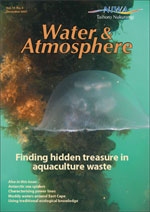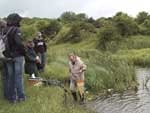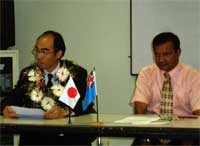PDF of this article (142 KB)




Revised guide to deepsea invertebrates
The Ministry of Fisheries has published a revised edition of A guide to common deepsea invertebrates in New Zealand waters, compiled by NIWA staff Di Tracey, Owen Anderson, and Reyn Naylor, with input in each chapter from several taxonomic experts. The guide amalgamates the first edition of the deepsea invertebrate guide and a crab guide, and incorporates a further 98 species. It provides identification sheets for over 200 invertebrate species, each with an improved colour image and a description of the key diagnostic features.
Most of the species in the guide are commonly encountered when trawling in water depths of more than 200 m.
By supporting more accurate identification, the new guide will improve monitoring of trends in the capture and distribution of incidental bycatch.
For a free CD of the manual, contact: Beatrice Stewart, Ministry of Fisheries, PO Box 1020, Wellington 0-4-819 4265, [email protected]
Upskilling for NIWA technicians
As recipients of QEII Technicians’ Study Awards, NIWA technicians Karen Thompson and Kristel van Houte-Howes have recently been to the UK for advanced training.
Sampling and identifying freshwater algae
Karen works in Hamilton with NIWA’s Blue-Green Algal Monitoring Service, identifying and counting a wide variety of freshwater algal species from a range of different water bodies. For her award, Karen attended two courses at the University of Durham taught by Professor Brian Whitton and Dr David John, recognised leaders in the field of algal identification. The courses provided training in the ecology, sampling, and identification of all freshwater algal groups, and included lectures, field trips, and laboratory-based microscopic analysis.
New Zealand is physically isolated from experts in this everdeveloping field; new and revised classifications are introduced as techniques and equipment improve. The training experience was very beneficial for Karen, who explains, “In New Zealand there is a shortage of well trained and skilled freshwater algal taxonomists. The new skills and knowledge I obtained have given me a lot more confidence as an ecologist and taxonomist and will not only benefit me and NIWA in the on-going monitoring of lakes and rivers, but also help contribute to the protection and restoration of our New Zealand waterways.”
Crustacean behaviour and physiology
Kristel’s work at NIWA in Hamilton involves identifying chemical signals in crab communication. She took her award at the University of Hull, learning specialist skills in crustacean laboratory trials and behavioural studies from European researchers who are at the forefront of marine chemical ecology. Through one-on-one tuition and direct involvement in laboratory assays, Kristel was able to pick up techniques and skills that will help advance crustacean science in New Zealand.
Recent work by Dr Jörg Hardege and his team at Hull has identified the pheromone used by the shore crab Carcinus maenas to attract mates. Their studies have also compared seasonal influence on decision making (sex versus food) in the crab, pheromone complexity, receptor function, and environmental control of reproductive behaviour. While at the university, Kristel gained in-depth knowledge about this work, the behavioural trials involved, and how these were developed into reliable bioassays.
As Kristel notes, “This training has also enabled NIWA to foster relationships with researchers at the University of Hull involved in chemical ecology work, and we are embarking on some collaborative work in the near future.”
For further information, contact: Karen Thompson, 0-7-859 1895, [email protected] Kristel van Houte-Howes, 0-7-859 1870, [email protected]
To learn more about the QEII Technicians’ Training Awards visit the Ministry of Education website: www.minedu.govt.nz
